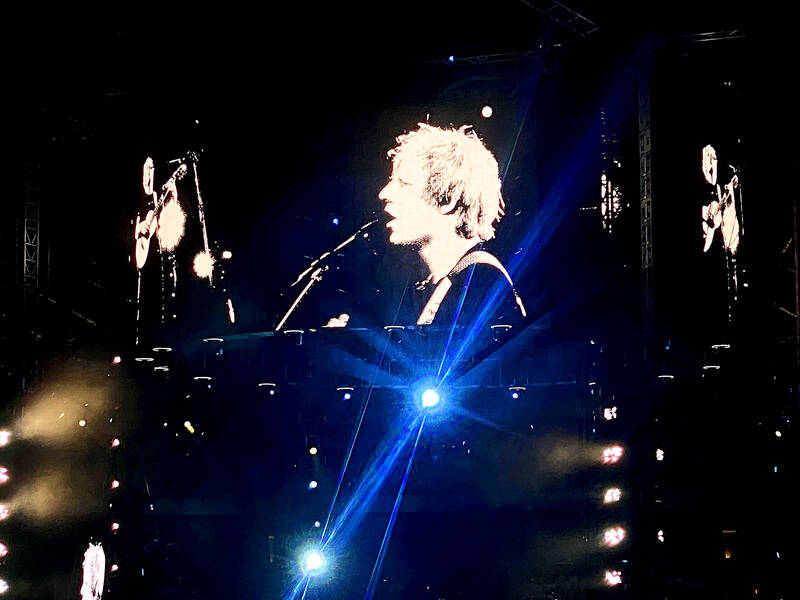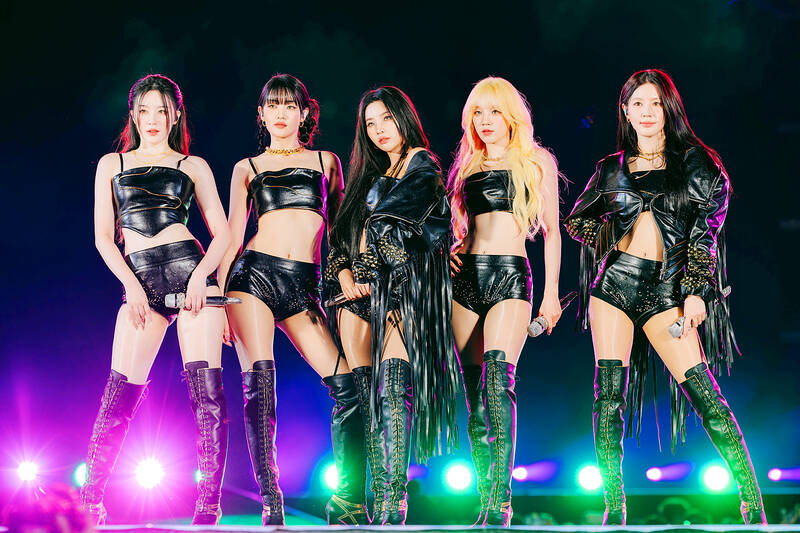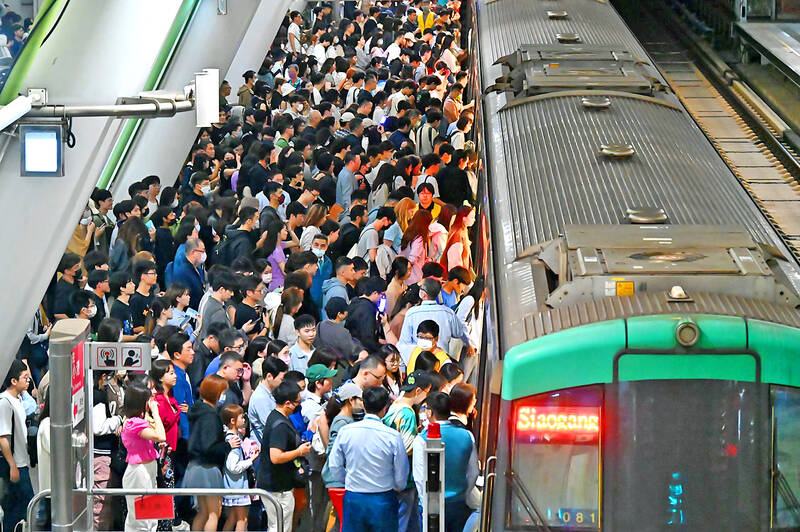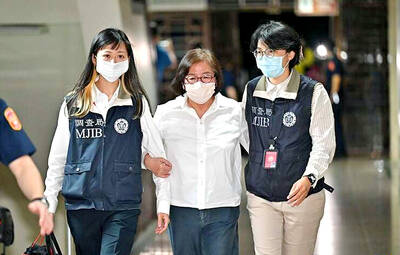Kaohsiung’s development of the concert economy has borne fruitful outcomes. Data showed that 96 pop concerts of various sizes have been held in the city from January to last month, with performances from local and international artists, such as British singer-songwriter Ed Sheeran. More than 950,000 people have attended concerts, resulting in revenues of at least NT$3.2 billion (US$100.12 million).
While Taiwanese pop superstars Jay Chou’s (周杰倫) and Chang Hui-mei’s (張惠妹) upcoming solo concerts at the Taipei Dome in December have caused a sensation, 117 concerts have already been staged in Kaohsiung last year at venues such as the Kaohsiung National Stadium, Kaohsiung Arena, Kaohsiung Music Center and Pier-2 Art Center. Data from the city government showed that 1.39 million people attended these events, with their consumption of food, accommodation and other services or products generating more than NT$4.5 billion.
The craze continued into this year, with 96 concerts attracting more than 950,000 people from January to last month, the data showed.

Photo courtesy of a reader
US singer-songwriter Bruno Mars and Taiwanese pop group Energy earlier this month performed in Kaohsiung. Their gigs were followed by Japanese rock band One Ok Rock.
It was projected that more than 120 concerts would be held in the city this year and attract more than 1 million concertgoers.
The average expenses of overnight visitors were NT$1,158, while same-day visitors spent NT$5,736 on average, a 2022 survey by the Tourism Administration found.

Photo: CNA
Concerts by superstars — Taiwanese rock band Mayday (五月天) for example — have attracted overnight visitors and same-day visitors and brought in an estimated tourism revenue of NT$32.7 billion, Kaohsiung City Government’s Department of Tourism said.
To multiply the economic benefits of pop concerts, the city government has launched a program to give out NT$50 night market coupons with concert tickets, thereby boosting the income of shopping areas around night markets and department stores, Kaohsiung Economic Development Bureau director-general Liao Tai-hsiang (廖泰翔) said.
The city’s catering industry has generated gross revenue of NT$39.7 billion and the hotel industry saw NT$9.2 billion revenue in the first half of this year, both a new high, he said.

Photo: Wang Jung-hsiang, Taipei Times
The concert business has also reinvigorated local economies in the city.
Tourists and income flowing into night markets could increase by at least 30 percent during a pop concert, as concert visitors would flock to the Liouhe Night Market (六合夜市) with plenty of coupons within one hour after the concert ends, Liouhe Night Market management committee head Chuang Chi-chang (莊其章) said.
H2O Hotel (水京棧國際酒店) vice president Pao Chun-yan (鮑俊彥) said they would be fully booked whenever a concert takes place at the Kaohsiung National Stadium or Kaohsiung Arena, producing “more than enough” income.
Many concert visitors would call a cab during the 24 hours before a concert, an Uber taxi driver surnamed Huang (黃) said, adding that “it feels good to drive fans to a concert in support of their dreams to stargaze.”
South Korean girl group Blackpink’s concert at the Kaohsiung National Stadium on Mar. 18 to 19 last year not only sold out, but also resulted in hotels in the region being fully booked, a bed and breakfast (B&B) owner surnamed Chen (陳) said.
A four-member family from Hsinchu booked all five rooms of her B&B for the two nights and paid more than NT$50,000 via credit card online, Chen said, adding that their purchase of food and concert tickets in the city must have amounted to at least NT$200,000.
Kaohsiung’s airport, harbor, five-star hotels and 55,000-seat National Stadium has made the city the top destination in Taiwan for international stars, Kaohsiung Bureau of Cultural Affairs Deputy Chief Chien Chia-lun (簡嘉論) said.
Kaohsiung Mayor Chen Chi-mai (陳其邁) oversees a streamlined process to provide artists with administrative support, he said, adding that when a concert date is confirmed, the secretary-general coordinates with different departments and agencies.
In the lead up to the event, coordination is raised to the deputy mayor, and on the day of the event, the mayor assumes the role of lead coordinator and heads the command center which monitors the security, traffic and medical situation, Chien said.
Kaohsiung’s efforts to attract high-profile concerts have significantly bolstered the city’s hospitality sector and makes for a successful case study in urban tourism, Shu-Te University’s Department of Leisure & Tourism Management assistant professor Yang Chih-chung said.
Local officials have generally supported the economic benefits of concerts in the city.
Although the concerts do benefit the city, they mostly occur on weekends and holidays, so the city must work to improve its weekday attractions, Kaohsiung City Councilor Chiu Chun-hsien (邱俊憲) said.
Kaohsiung needs to expand business opportunities beyond accommodations and night markets to ensure tourists continue to visit even when there are no concerts, city Councilor Pai Chiao-yin (白喬茵) said.
Those in the live entertainment industry should implement real name registration rules and punish scalpers to protect the public’s interests and address concerns about ticket prices, Chinese Nationalist Party (KMT) Legislator Ko Chih-en (柯志恩) said.
Outside of concerts, Kaohsiung is also home to industries such as semiconductors and artificial intelligence so many fans and technology industry professionals travel to and from the city, Democratic Progressive Party Legislator Lee Po-yi (李柏毅) said, adding that there is still room for improvement in airport facilities and expanding the number of connections.
Kaohsiung’s status as the nation’s “concert capital” would face a new challenge as the Taipei Arena is due to open for concerts and musical performances. The arena can seat tens of thousands of spectators and overcome weather concerns.
Regarding the development of the Taipei Arena for concerts, Kaohsiung City officials said that some international stars are “picky beyond belief” when it comes to pre-event requirements and demands. Some demand changes to restrooms and movement routes.
At times, production teams and agencies even set up barriers within the venue to prevent spoiling the event lighting, stage design or performance content, they added.
Kaohsiung has already developed a skilled team capable of keeping pace with artists’ requirements, and the established brand and reputation of the city is an intangible asset that other cities would find difficult to replicate in the short term, they said.
The most important aspect of a concert is the performer, so Kaohsiung should evaluate venue capacities based on their characteristics to hold concerts in different locations and emphasize unique features to create a comfortable atmosphere, said Ho Ping-tsan (何秉燦), an associate professor at the National Kaohsiung University of Science and Technology’s Department of Tourism Management.
This approach is necessary to face the challenges posed by Taipei Arena’s development and potential as a concert venue, Ho said.
Additional reporting by Wang Jung-hsiang and Hsu Li-chuan

Costa Rica sent a group of intelligence officials to Taiwan for a short-term training program, the first time the Central American country has done so since the countries ended official diplomatic relations in 2007, a Costa Rican media outlet reported last week. Five officials from the Costa Rican Directorate of Intelligence and Security last month spent 23 days in Taipei undergoing a series of training sessions focused on national security, La Nacion reported on Friday, quoting unnamed sources. The Costa Rican government has not confirmed the report. The Chinese embassy in Costa Rica protested the news, saying in a statement issued the same

Taiwan is to extend its visa-waiver program for Philippine passport holders for another year, starting on Aug. 1, Minister of Foreign Affairs Lin Chia-lung (林佳龍) said on Friday. Lin made the announcement during a reception in Taipei marking the 127th anniversary of Philippine independence and the 50th anniversary of the establishment of the Manila Economic and Cultural Office (MECO) in Taiwan, the Ministry of Foreign Affairs said. The decision reflected Taiwan’s commitment to deepening exchanges with the Philippines, the statement cited Lin as saying, adding that it was a key partner under the New Southbound Policy launched in 2016. Lin also expressed hope

Temperatures in New Taipei City’s Sindian District (新店) climbed past 37°C yesterday, as the Central Weather Administration (CWA) issued heat alerts for 16 municipalities, warning the public of intense heat expected across Taiwan. The hottest location in Taiwan was in Sindian, where the mercury reached 37.5°C at about 2pm, according to CWA data. Taipei’s Shilin District (士林) recorded a temperature of 37.4°C at noon, Taitung County’s Jinfeng Township (金峰) at 12:50 pm logged a temperature of 37.4°C and Miaoli County’s Toufen Township (頭份) reached 36.7°C at 11:40am, the CWA said. The weather agency yesterday issued a yellow level information notice for Taipei, New

CASE: Prosecutors have requested heavy sentences, citing a lack of remorse and the defendants’ role in ‘undermining the country’s democratic foundations’ Five people affiliated with the Chinese Nationalist Party (KMT), including senior staff from the party’s Taipei branch, were indicted yesterday for allegedly forging thousands of signatures to recall two Democratic Progressive Party (DPP) lawmakers. Those indicted include KMT Taipei chapter director Huang Lu Chin-ru (黃呂錦茹), secretary-general Chu Wen-ching (初文卿) and secretary Yao Fu-wen (姚富文), the Taipei District Prosecutors’ Office said in a news release. Prosecutors said the three were responsible for fabricating 5,211 signature forms — 2,537 related to the recall of DPP Legislator Wu Pei-yi (吳沛憶) and 2,674 for DPP Legislator Rosalia Wu (吳思瑤) — with forged entries accounting for